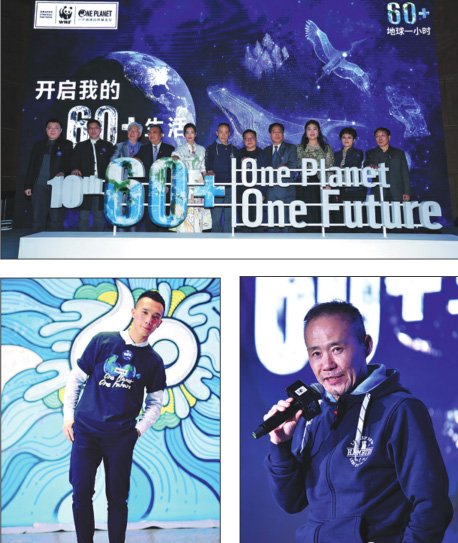Turning lights off to illuminate environmental protection


Li Tengfei tries to avoid using disposable items. The 23-year-old brings slippers when he travels and uses a drinking bottle rather than buying bottled water.
He believes it's important for university students to reduce the use of plastic bags and disposable chopsticks, since food delivery is popular on campus. And he has persuaded his roommates to use their own chopsticks when ordering takeout.
The senior from Hebei province has remained committed to environmental protection since he first volunteered for his university's Earth Hour activities as a freshman.
Earth Hour is a global movement started by the World Wide Fund for Nature in which millions of people around the planet turn off nonessential lights for an hour every year on the last Saturday of March.
"More teachers and students are joining the campaign. It's about enabling more people to know about its significance and carry out their promises in daily life," Li says.
He first heard about it in 2010 because his idol, singer Li Yuchun, was China's Earth Hour ambassador.
The student says campus volunteers begin promoting the event a week in advance and ask students to sign a pledge to participate. They use banners, exhibition boards, posters and social media but don't distribute leaflets that may be thrown away.
When the hour arrives, the university kills the dorm lights and students hold hands while enjoying an unplugged concert.
This year marks the 10th Earth Hour in China. The campaign was originally started in Sydney in 2007.
It has been expanding its scope in China over the past decade to include decisions about such activities as shopping and commuting, as more people become aware of environmental protection.
"Our logo has evolved from 60 to 60+," WWF China's chief representative Lo Sze Ping says.
"More importantly, it's about what we can do after the one hour - how your lifestyle will adapt after the hour."
This year, WWF proposed five principles to guide daily life, such as using fewer plastic and disposable items.
"It's not hard to implement them. All you need is to bring a small change in your life," Lo says, showing his personal-care products - a toothbrush and a small cloth bag for snacks.
Earth Hour has expanded in China via advocacy from local governments, organizations, communities, corporations, media and education institutions, he believes.
"More citizens and organizations are adopting the concept of sustainable development under the influence of Earth Hour, creating a positive social influence."
Only a dozen cities joined the first Earth Hour in China. But much has changed with greater global awareness of environmental protection and social media's development.
"In this context, how to turn environmental awareness into action and make a habit out of it are a bit challenging. That's why we try to engage the public and spread our ideas through different means."
Greater awareness has also encouraged the advancement of greener transportation options like shared bikes and carpooling.
Lo says that shutting out the lights during the hour is "more about symbolic significance. It's a collective action with a low threshold for people to join so that we can reflect on what we can do for our planet.
"The lights-off ceremonies at important landmarks in China have a great visual impact. It not only tells people to pay more attention about the problems we're facing but also shows us that when people unite under a single cause we can really make a difference.
Real estate giant China Vanke Co Ltd founder Wang Shi has advocated for the campaign since 2010.
Last year, the company promoted garbage-classification among its nearly 300 communities in 30 Chinese cities.
"Earth Hour aims to call for the public to take action to tackle global warming," Wang says.
He realized climate change's impact when he conquered Qomolangma, known as Mount Everest in the West, in 2003. He started to think about its connections with himself, the company and China's economic development.
"The main causes are carbon emissions and deforestation. So, it's important for the company to reduce its use of wood and water in construction."
China Vanke is a pioneer in the country's green construction. Its properties have a Green Star rating, which refers to the national green-building standard.
In 2014, it became the first real estate company to join the WWF Climate Savers program, which aims to increase business' contributions to reducing carbon-dioxide emissions.
It made a commitment to reducing 1.46 million tons carbon dioxide by increasing industrialized-housing techniques and developing 49 million square meters of such housing by 2018.




































